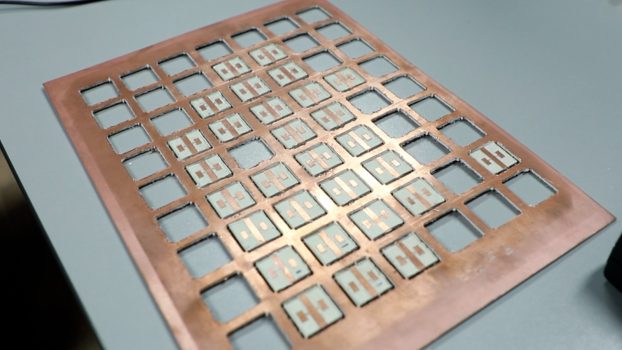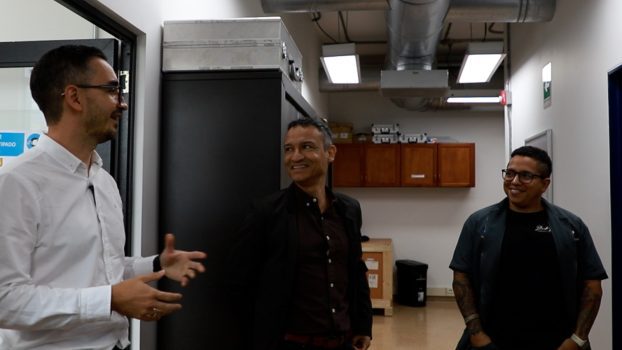Researchers in Medellín Develop Microwave Biosensor for Early Colorectal Cancer Detection
Researchers at the Institución Universitaria ITM and the Universidad de Antioquia have developed a microwave-based biosensor for the rapid, cost-effective, and non-invasive detection of biomarkers associated with colorectal cancer. Colorectal cancer is a globally prevalent and highly lethal neoplasm, and prompt detection remains the most critical factor in improving patient survival rates.

Microwave-based biosensors. Photo credit: Medellín Mayor’s Office.
The new diagnostic technology is intended to address the limitations of existing detection methods, which are often costly, difficult to access, or require specialized laboratory infrastructure. Functioning as a “laboratory-on-a-chip,” the device is specifically designed to identify anti-p53 autoantibodies (Aabs anti-p53) in a blood sample. The presence of these autoantibodies serves as an early warning indicator linked to the initial development of tumors.
The core advantage of the microwave device is its ability to characterize cancer biomarkers without extensive sample manipulation, according to Sebastián Montoya Villada, a professor and researcher at ITM. “The microwave signal is easily measurable, and our laboratory equipment significantly streamlines its analysis and characterization,” Villada stated.
The device employs label-free detection, a feature that expedites the process. It operates using a small copper surface coated with the p53 antigen, which acts as a molecular capture mechanism for the target antibodies. Unlike many assays that rely on chemical markers, the biosensor measures the exact moment the antibodies bind to the surface via a microwave signal, resulting in a faster and simpler procedure.

Researchers at ITM and Universidad de Antioquia developed a microwave biosensor for fast, affordable, and non-invasive detection of colorectal cancer biomarkers, crucial for early diagnosis and improved survival. Photo credit: Medellín Mayor’s Office.
Laboratory evaluations of the device demonstrated high sensitivity and accuracy, capable of detecting very low concentrations of the antibodies. The results were shown to be comparable to those obtained using the conventional Enzyme-Linked Immunosorbent Assay (ELISA) method.
Montoya Villada also addressed the technology’s commercial application, noting, “The technology is easily integrable and, therefore, commercializable. Furthermore, it is a reusable solution, which represents a key distinction when compared to other technologies that are inherently limited to single use before being discarded.”
Jahir Orozco Holguín, a professor at the Universidad de Antioquia, emphasized the practical implications of the technology’s performance compared to established techniques. “The results are comparable to those obtained with conventional techniques like ELISA, with the crucial difference being that the latter requires robust equipment, specialized personnel, and large facilities,” Holguín said.
The next strategic objective for the research teams is to miniaturize and scale the technology. This effort aims to decentralize the diagnostic process, thereby making it accessible to patients in rural and geographically isolated areas where specialized medical infrastructure is scarce.
This Colombian-developed technology, leveraging a low-cost, reusable design, establishes a new approach in oncological diagnosis. The platform also presents opportunities for the identification of other biomarkers associated with various classes of cancer, potentially contributing to both earlier detection and more personalized patient care in Colombia and internationally.
Video and photo credit: Medellín Mayor’s Office.



























